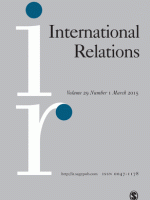What theory - if any - is securitization?
One of the great appeals of securitization theory, and a major reason for its success, has been its usefulness as a tool for empirical research: an analytic framework capable of practical application. However, the development of securitization has raised several criticisms, the most important of which concern the nature of securitization theory. In fact, the appropriate methods, the research puzzles and type of evidence accepted all derive to a great extent from the kind of theory scholars bequeath their faith to. This Forum addresses the following questions: What type of theory (if any) is securitization? How many kinds of theories of securitization do we have? How can the differences between theories of securitization be drawn? What is the status of exceptionalism within securitization theories, and what difference does it make to their understandings of the relationship between security and politics? Finally, if securitization commands that leaders act now before it is too late, what status has temporality therein? Is temporality enabling securitization to absorb risk analysis or does it expose its inherent theoretical limits?
